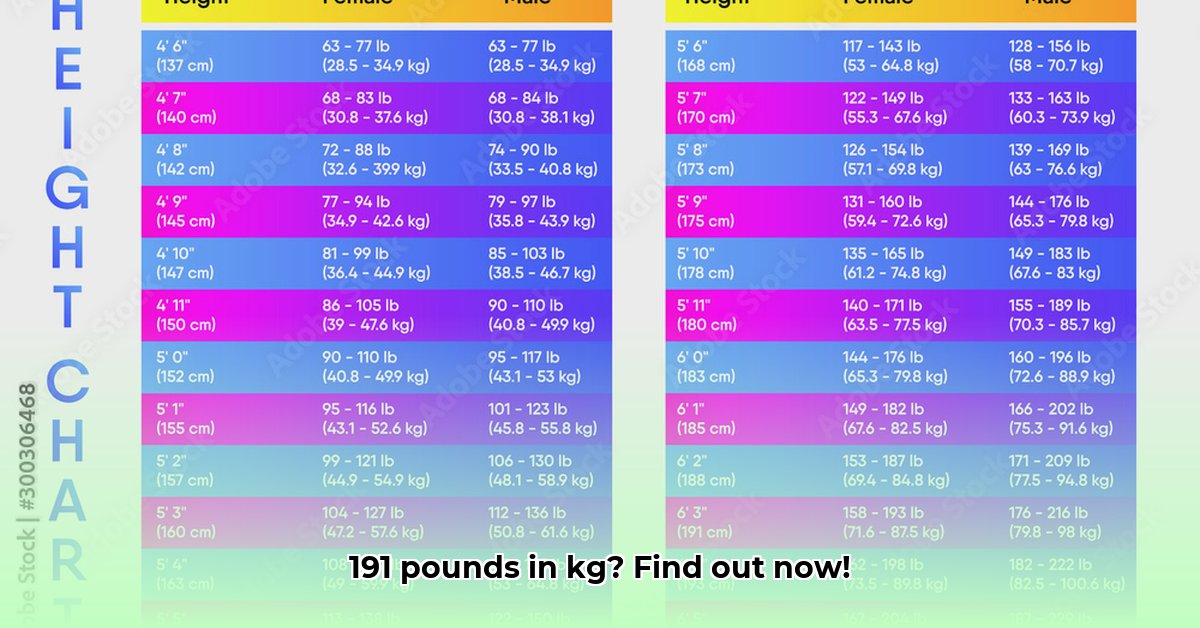
A Step-by-Step Guide to Precise Pound-to-Kilogram Conversion
Need to convert 191 pounds to kilograms? This guide provides a clear, step-by-step process for accurate conversion, highlighting the importance of precision and offering practical applications. Whether you're dealing with everyday tasks or scientific calculations, understanding this conversion is crucial. For more examples, check out this helpful pounds to kg converter.
Understanding the Conversion Factor: The Foundation of Accuracy
The key to converting pounds (lbs) to kilograms (kg) lies in the conversion factor: 1 lb ≈ 0.453592 kg. This means one pound is approximately equal to 0.453592 kilograms. This seemingly small difference can significantly impact results, especially in scientific contexts. Why is precision so important? Because even minor inaccuracies can accumulate and lead to substantial errors in further calculations.
Converting 191 Pounds to Kilograms: A Practical Approach
Let's convert 191 pounds to kilograms using the precise conversion factor for heightened accuracy. These steps ensure a reliable result, with a focus on precision:
- Start with the weight: We begin with 191 pounds.
- Apply the conversion factor: Multiply the weight in pounds by the conversion factor: 191 lbs * 0.453592 kg/lb.
- Calculate the result: This yields approximately 86.636352 kg.
- Consider significant figures: The initial weight (191 lbs) has three significant figures. Therefore, we round the final answer to three significant figures: 86.6 kg. This maintains the integrity of our original measurement.
Therefore, 191 pounds is approximately equal to 86.6 kilograms.
Precision and Significant Figures: Maintaining Accuracy
The concept of significant figures is essential for maintaining accuracy in scientific and technical calculations. Significant figures represent the meaningful digits in a measurement, indicating the precision of the measurement itself. Premature rounding can introduce errors that accumulate and affect the reliability of the final result. For instance, using a less precise factor like 0.45 kg/lb would lead to a result of approximately 86 kg, losing valuable accuracy. Consequently, using the more precise conversion factor (0.453592 kg/lb) is essential for achieving the needed precision. Have you ever encountered situations where seemingly minor inaccuracies had significant consequences?
Real-World Applications: Where This Conversion Matters
The ability to accurately convert pounds to kilograms is invaluable across various fields:
- International Trade and Shipping: Shipping and logistics rely heavily on metric units. Accurate weight conversion prevents costly errors and delays.
- Scientific Research: In fields like chemistry, physics, and medicine, precise weight measurements are critical for accurate results and reproducibility of experiments.
- Cooking and Baking: Many international recipes use the metric system, necessitating accurate weight conversions for consistency.
- Personal Fitness: Monitoring weight loss goals using different units requires this conversion for tracking progress.
Beyond the Basics: Expanding Your Unit Conversion Skills
Mastering the pound-to-kilogram conversion is a stepping stone to broader proficiency in unit conversion. Understanding fundamental conversion principles enables you to confidently tackle other unit conversions, improving accuracy and efficiency in diverse applications. What other conversions do you frequently use or require? Exploring additional conversions like inches to centimeters or miles to kilometers can significantly broaden your practical skills.
Frequently Asked Questions (FAQs)
Q: Can I use a simpler conversion factor, like 0.45 kg/lb? A: While simpler, it reduces the accuracy of your results. Using the more precise 0.453592 kg/lb is recommended for greater precision, especially essential for scientific purposes.
Q: What are significant figures, and why are they important? A: Significant figures represent the meaningful digits indicating a measurement's accuracy. Premature rounding of significant figures can introduce errors which accumulate in complex calculations.
Q: Where can I find online converters for unit conversion? A: Many free online tools perform unit conversions quickly and accurately. A simple search for "unit converter" will provide multiple options.